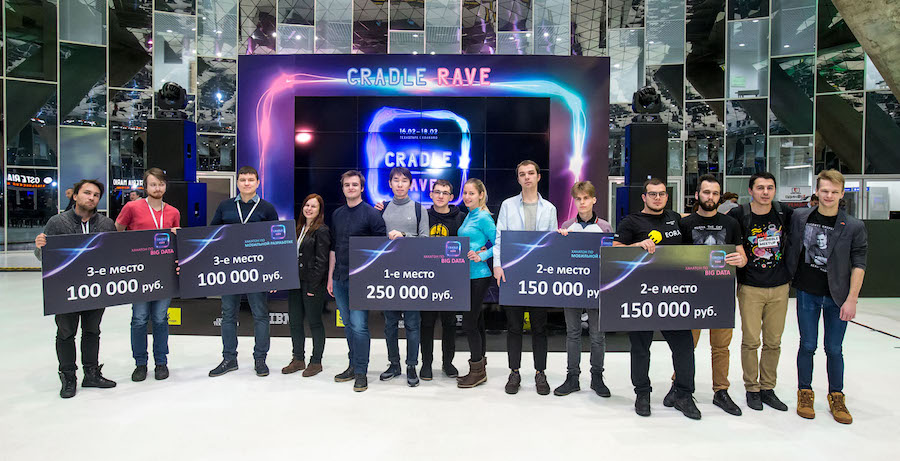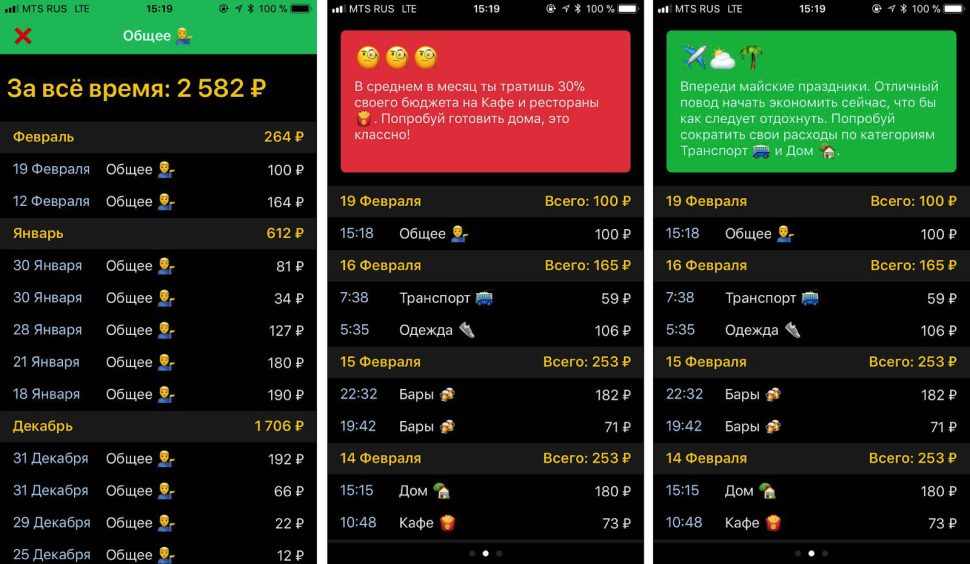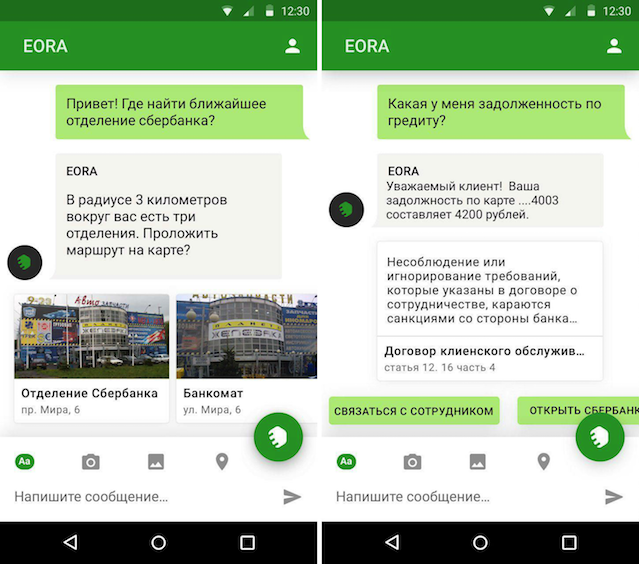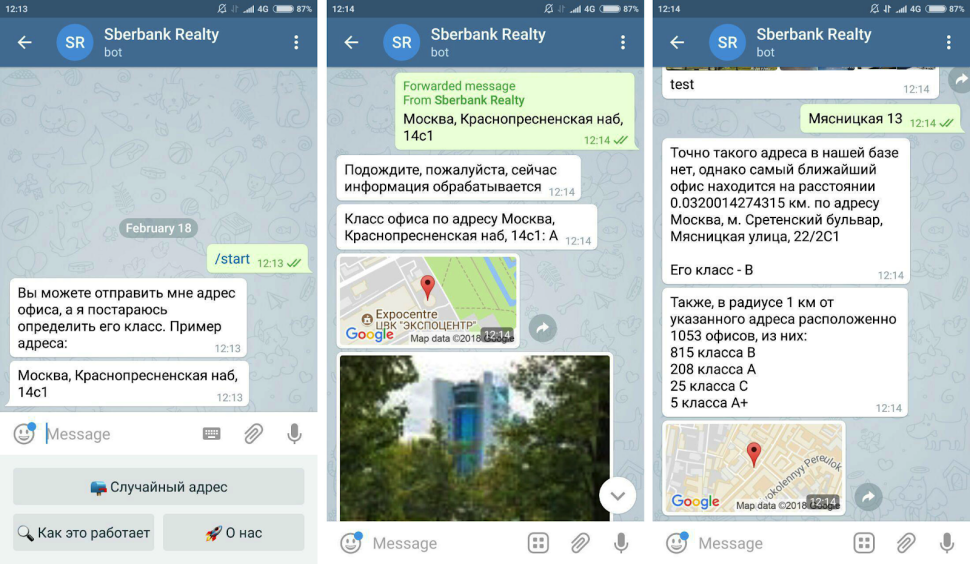The best hackathon ravers: big data and mobile development
Last week we hosted the big Cradle: Rave conference in Skolkovo. We organized many presentations on various topics, as well as three-day hackathons on Big Data and mobile development. In this post we will talk about the best ideas from those that generated more than 25 teams from Moscow, Samara and Innopolis.

We evaluated the solutions to problems in accordance with what we ourselves strive for at SberTech. The main criteria are relevance, scalability for 20 million users, the relative ease of implementation and development of functionality. We also took into account the originality of the approach and the technical component, the level of implementation of the prototype and the presentation of teams.
At the mobile development hackathon, we expected three applications from the participants:
The third place was taken by the Moscow ITiger team with the SberPhone application on iOS and Android. It provides financial and navigation information: where is the nearest ATM, how to get a loan, is it possible to make a deposit. Also in SberPhone there is a messenger with the function of audio and video calls, voice chat bot and data encryption. The application turned out to be good enough and complete to launch on the market.

In second placeturned out to be a Save Money team with a financial planner for students. The app helps you plan your budget, manage expenses and financial risks. Users can set the amount of expenses / income, categorize spending, plan purchases. To simplify the work, the scheduler gives tips. During the hackathon, the project was developed from scratch, without the use of third-party frameworks.

Nobody got the first place at the hackathon in mobile development. The jury did not see in any project the originality of the idea and execution, as well as the use of innovation. Basically, all the participants showed designers from ready-made frameworks and solutions, some used their best practices from past hackathons. In addition, no team worked on the third task, with an interactive map of the city, which required the use of various technologies, including VR.
According to big data, the hackathon participants created two products:
Here the level of participants was higher than expected. The winners coped with the first task equally well. As a result, the winner was determined by the optimization task and various nuances.
The third place was taken by the GoGeo team with the gogeo_bot bot . You ask the bot the address and other conditions, and in return you get useful demographic information: how many people live in a given accessibility from the place, what income the population has, what profit the business working there, etc. In the future, the team plans to bring the project to a full-fledged service that will help open up new points of business. GoGeo members will be very grateful if you leave feedback on their website: www.gogeo.me .

Second placeat the EORA team. She solved the problem of determining the class of the office by analyzing the comments of the seller or landlord. Of these, the system identifies the relevance of the sale of the office, the availability of an elevator in the building, decoration in the office itself and other information. Based on the building’s coordinates, the system determines the street, district and administrative district, and the crime rate by district. The system also knows how to find the nearest metro station and the distance to it, as well as get rid of unnecessary data. Participants completed all -1 gaps and processed all the data using CatBoost, the machine learning model from Yandex. As a result, a result of ~ 0.9 was obtained by the metric f1_score macro - this gave the second place.
EORA solved the problem of optimizing passenger transportation using linear programming. The team algorithm found the optimal route with a minimum total mileage. When calculating the restrictions, the user was taken into account: the user can only sit in one car at a time, the driver can drive only one car, the user can be refused a trip, etc. During route construction, the algorithm takes into account the position of both the driver and the client.

The winner of the bigdata-hackathon was the Canape team. Their chatbot for the first task seemed to the jury as the best for the implementation of the basic functions, and a search was also added to them by geolocation with voice control.
The team divided the second task into two parts. In the first part, the algorithm estimates the distribution of orders and moves drivers so as to effectively cover the entire territory and quickly pick up customers. In the second part, the movement of drivers with passengers is optimized so that they pick up travel companions along the road and carry up to four passengers at a time.

The winner of the hackathon in big data received 250 thousand rubles, the teams that took second and third places - 150 and 100 thousand each.
Special thanks to our partner, IBM, for providing the platform.IBM Data Science Experience (online collaboration environment for data mining tasks)

We evaluated the solutions to problems in accordance with what we ourselves strive for at SberTech. The main criteria are relevance, scalability for 20 million users, the relative ease of implementation and development of functionality. We also took into account the originality of the approach and the technical component, the level of implementation of the prototype and the presentation of teams.
Mobile development
At the mobile development hackathon, we expected three applications from the participants:
- personal financial manager with functions of recommendations and reporting,
- instant messenger with chatbot features, audio and video calls,
- An interactive map of the city with branches and ATMs.
The third place was taken by the Moscow ITiger team with the SberPhone application on iOS and Android. It provides financial and navigation information: where is the nearest ATM, how to get a loan, is it possible to make a deposit. Also in SberPhone there is a messenger with the function of audio and video calls, voice chat bot and data encryption. The application turned out to be good enough and complete to launch on the market.

In second placeturned out to be a Save Money team with a financial planner for students. The app helps you plan your budget, manage expenses and financial risks. Users can set the amount of expenses / income, categorize spending, plan purchases. To simplify the work, the scheduler gives tips. During the hackathon, the project was developed from scratch, without the use of third-party frameworks.

Nobody got the first place at the hackathon in mobile development. The jury did not see in any project the originality of the idea and execution, as well as the use of innovation. Basically, all the participants showed designers from ready-made frameworks and solutions, some used their best practices from past hackathons. In addition, no team worked on the third task, with an interactive map of the city, which required the use of various technologies, including VR.
Big data
According to big data, the hackathon participants created two products:
- a chatbot that provides real estate analytics in a given area based on machine learning algorithms,
- algorithm for optimizing joint passenger traffic with a predetermined amount of resources.
Here the level of participants was higher than expected. The winners coped with the first task equally well. As a result, the winner was determined by the optimization task and various nuances.
The third place was taken by the GoGeo team with the gogeo_bot bot . You ask the bot the address and other conditions, and in return you get useful demographic information: how many people live in a given accessibility from the place, what income the population has, what profit the business working there, etc. In the future, the team plans to bring the project to a full-fledged service that will help open up new points of business. GoGeo members will be very grateful if you leave feedback on their website: www.gogeo.me .

Second placeat the EORA team. She solved the problem of determining the class of the office by analyzing the comments of the seller or landlord. Of these, the system identifies the relevance of the sale of the office, the availability of an elevator in the building, decoration in the office itself and other information. Based on the building’s coordinates, the system determines the street, district and administrative district, and the crime rate by district. The system also knows how to find the nearest metro station and the distance to it, as well as get rid of unnecessary data. Participants completed all -1 gaps and processed all the data using CatBoost, the machine learning model from Yandex. As a result, a result of ~ 0.9 was obtained by the metric f1_score macro - this gave the second place.
EORA solved the problem of optimizing passenger transportation using linear programming. The team algorithm found the optimal route with a minimum total mileage. When calculating the restrictions, the user was taken into account: the user can only sit in one car at a time, the driver can drive only one car, the user can be refused a trip, etc. During route construction, the algorithm takes into account the position of both the driver and the client.

The winner of the bigdata-hackathon was the Canape team. Their chatbot for the first task seemed to the jury as the best for the implementation of the basic functions, and a search was also added to them by geolocation with voice control.
The team divided the second task into two parts. In the first part, the algorithm estimates the distribution of orders and moves drivers so as to effectively cover the entire territory and quickly pick up customers. In the second part, the movement of drivers with passengers is optimized so that they pick up travel companions along the road and carry up to four passengers at a time.

The winner of the hackathon in big data received 250 thousand rubles, the teams that took second and third places - 150 and 100 thousand each.
Special thanks to our partner, IBM, for providing the platform.IBM Data Science Experience (online collaboration environment for data mining tasks)
